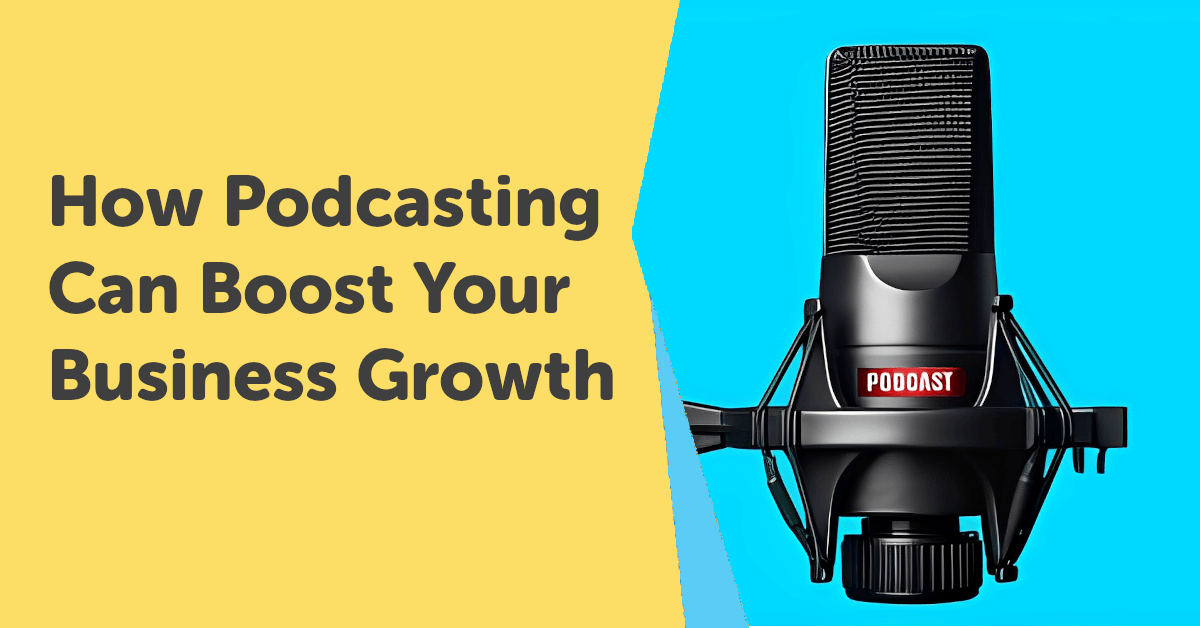
Let’s dive into this exciting world of how podcasting can boost your business growth! 😊 Now, I’m no stranger to podcasts. Having spent a considerable chunk of my time listening to them, creating them, and helping others start their own, I can tell you that they’re a real game changer. Podcasting is not just for fun, but as you will see, there’s real tangible value for scaling a business.
Introduction
So, what is a podcast? Well, in simple terms, it’s an audio show that can be downloaded or streamed, usually part of a series, and often focused on a particular topic or theme. Imagine your favourite radio show, but on demand, anytime, anywhere, and you’re not far off.
Podcasting defined
Ah, podcasting… it’s a funny old world, isn’t it? On the surface, it’s just about talking, isn’t it? But delve a bit deeper, and you realise it’s about so much more. Podcasting, at its heart, is about sharing. It’s about communicating ideas, emotions, stories, and experiences in an audio format that can be consumed by anyone, anywhere, at any time. It’s a direct line of communication from the host to the listener, creating a personal, intimate connection that’s hard to find in other mediums.
What makes podcasting so remarkable is that it allows for long-form conversations and detailed discussions that simply can’t be achieved with traditional media like TV or radio. Not to mention, the flexibility! You can listen to a podcast while driving, while exercising, or even while cooking dinner. It’s information and entertainment, all rolled into one, accessible right at your fingertips.
History and current popularity of podcasting
Cast your mind back to the mid-2000s. Blogs were the hot new thing, social media was just getting started and then came along podcasting. The term itself is a blend of “iPod” and “broadcast,” hinting at its roots in Apple’s iconic device. What began as a niche hobby for tech enthusiasts quickly grew into a global phenomenon, with millions of podcasts available today covering every topic you can imagine, from business and education to comedy and true crime.
Fast-forward to the present day and podcasting is in the midst of a golden age. Podcasts have truly become mainstream, with nearly a third of the global population tuning into them. It’s not just about the numbers when it comes to podcasting; it’s about the level of engagement they deliver. Podcast listeners tend to be highly engaged, loyal, and very passionate about the shows they listen to. That’s pure gold for businesses looking to connect with their audience.
Podcasting’s influence on business growth
Ever wondered how podcasting is affecting the business landscape? Well, it’s kind of like adding a turbocharger to your marketing engine. Podcasting offers businesses an innovative way to reach potential customers, engage with them, and build brand loyalty. But the real beauty of it? It’s all done in a non-invasive, non-pushy way.
Businesses that jumped on the podcast bandwagon have seen an uptick in website traffic, increased brand exposure, and even a boost in sales. It’s all about reaching your audience in a fresh, engaging way, and building a relationship based on trust and value.
About this post
In this post we’re going to get down to the nuts and bolts of podcasting for business, discussing everything from why podcasts are so effective, to how to start your own. We’ll also touch on the challenges you might face and how to tackle them head-on. We’ll also delve into some real-life success stories that may inspire you.
Understanding how podcasting can boost your business growth
Podcasts are more than just an entertaining way to pass the time; they also offer some pretty unique advantages from a business perspective.
What makes podcasting unique and effective
Alright, so what sets podcasting apart from other forms of marketing? First and foremost, it’s personal. When someone puts in their headphones and hits play, it’s like you’re sitting across from them, having a one-on-one conversation. This intimacy creates a strong bond between the host and the listener, and by extension, the listener and the brand.
Second, podcasting allows for a deeper level of content exploration. You can delve into topics, discussing them in great detail over multiple episodes. This positions you as an expert and builds trust with your audience.
Third, podcasting is a passive form of content consumption. People can listen while doing other tasks, making it a great way to reach busy individuals who might not have time to read blog posts or watch videos.
And finally, podcasts are incredibly versatile, in that you can create a podcast for any target audience, covering any topic, in a variety of formats. Your podcast could be interviews, storytelling, roundtable discussions, or solo rants, there’s going to be a format that is a great fit for your business to engage and activate your audience.
Storytelling and personal connection
Storytelling has been a part of human culture for millennia, and it’s a crucial aspect of podcasting too. By sharing stories, whether they’re your own or those of your guests, you can create an emotional connection with your audience. Storytelling is about sharing values, experiences, and ideas that resonate with listeners, more so than simply selling a product or service.
Storytelling is such a powerful tool in podcasting because it makes your content memorable. It humanizes your brand and makes it more relatable. And ultimately, people do business with those they like and trust.
The rise of podcast listenership
OK now let’s talk numbers. You know I’m a big fan of data, and the stats for podcasting are nothing short of impressive. As of 2023, there are more than 4.1 million podcasts registered. Apple alone has over 2 million podcasts and over 48 million podcast episodes globally. Yep, you heard that right!
In addition, Edison Research highlights that more than 73% of Americans aged 12 and older listened to a podcast in the last month. That’s over 152 million people! And this number continues to grow each year. With the increasing adoption of smart speakers and the rise of in-car listening, podcasting is set to reach even more ears in the coming years.
Influence on buying behaviour
So, we’ve established that podcasts have a broad reach. But what’s interesting is how they influence buying behaviour. Podcast listeners aren’t just passive consumers; they’re activated, and they’re engaged and loyal. This means they’re more likely to trust the host and take their recommendations into account when making purchasing decisions.
A study by the Interactive Advertising Bureau found that 54% of listeners who are either “somewhat” or “much more” likely to consider buying from a podcast sponsor vastly outweighs the 7% of listeners who are less likely. Now that’s the kind of stat that makes any marketer sit up and take notice!
The Basics of Podcasting for Business
Right, let’s get down to brass tacks. How do you go about starting a podcast for your business?
Steps in starting a podcast: from idea to publishing
Like all good things, starting a podcast begins with an idea. What do you want to talk about? Who is your target audience? What’s your unique angle?
Once you’ve got your concept sorted, it’s time to start planning your episodes. This involves everything from researching and scripting to arranging interviews and creating a recording schedule.
Next comes the recording phase. This can be as simple as hitting record on your smartphone, or as complex as using professional studio equipment. The key is to focus on quality. Listeners won’t stick around if they can’t hear what you’re saying.
Once you’ve got your episodes recorded, it’s time to edit. Editing a podcast involves cutting out mistakes, adding background music and sound effects, and ensuring the audio levels are balanced.
Then, you’ll need to host your podcast on a platform that will distribute it to podcast directories like Apple Podcasts and Spotify. This usually involves setting up an RSS feed, uploading your episodes, and writing show notes.
Finally, you publish your podcast and then promote it to the world! But remember, launching your podcast is just the beginning. To grow your audience, you’ll need to release episodes consistently and engage with your listeners.
Understanding the Target Audience
You wouldn’t start a business without understanding your target market, would you? The same goes for podcasting. Knowing who you’re speaking to is crucial for creating content that resonates and engages.
Consider what interests your audience, what problems they’re facing, and what questions they have. What time of day are they likely to listen to podcasts? Does your target audience have a preference for short, bite-sized episodes or longer, deep-dive conversations? The more you know about your listeners, the better you can tailor your podcast to their needs.
Essential equipment and software
Let’s talk podcasting gear now. You might be wondering, “Do I need to invest in a fancy microphone and high-end recording software to start a podcast?” Not necessarily. Having decent-quality equipment will improve the sound of your podcast, decent is by no means expensive.
For starters, you’ll need a decent microphone. USB microphones are a good choice for beginners due to their ease of use and affordable price. Next, you’ll need headphones for monitoring your audio. Any closed-back headphones should do the trick.
As for recording software, there are plenty of free and paid options available. Audacity is free and there’s a lot of love by its loyal users. Audacity has a user-friendly interface and extensive editing features, give it a try.
Podcast formats suitable for businesses
When it comes to podcast formats, there’s no one-size-fits-all solution. The best format for your podcast will depend on your niche/topic, your target audience, and your style.
The interview style is a popular format for podcasts, and for good reason. They provide a platform for interesting guests, generate engaging discussions, and require less preparation than solo shows.
If you’re a business that is looking to establish yourself as an industry thought leader then Educational podcasts are a great format. The Educational format involves teaching your audience about a specific topic or answering common questions.
Storytelling podcasts can be a powerful way to engage your audience, especially if you have compelling stories to share. This could involve sharing customer success stories, behind-the-scenes insights, or the journey of your business.
Finally, panel podcasts involve a group of people discussing a topic. This can create a dynamic, engaging conversation, but can also be more challenging to organise and edit.
Making Your Podcast Stand Out
With millions of podcasts out there, how do you make yours stand out from the crowd?
Importance of a Unique Selling Proposition (USP)
Your USP, or unique selling proposition, is what sets you apart from the competition. It’s the reason why someone should listen to your podcast instead of the countless others available. Your knowledge and unique perspective, interview skills, your expert guests, or even your sense of humour could be your USP. The key is to identify what you bring to the table and make sure it shines through in every episode.
Crafting engaging and high-quality content
Content is king, as they say, and this is especially true for podcasting. But creating engaging content isn’t just about what you say, it’s also about how you say it. It’s your voice and unique perspective that will bring your content to life. Ensure that you come across as being genuine, sound passionate, and always strive to provide value to your audience.
Consistency in Branding, Scheduling, and Delivery
When it comes to podcasting, consistency is key. This includes consistency in branding, scheduling, and content delivery. Your podcast should have alignment with your overall brand in terms of tone, values, and perspectives.
Scheduling consistency is also crucial. Decide on a publishing schedule and stick to it. This not only helps you stay organised, but it also lets your audience know when to expect new episodes.
Consistency in content delivery means maintaining a consistent quality and style across your episodes. This doesn’t mean every episode needs to be the same, but they should be cohesive and adhere to the expectations you’ve set for your listeners.
Promotion strategies for your podcast
Once you’ve created your podcast, you need to get it in front of listeners. There are several ways to promote your podcast, from paid ads, social media and email marketing to guest appearances on third-party podcasts.
But perhaps the most effective promotion strategy is leveraging your existing audience. Encourage your listeners to share your podcast with their friends, family, and social networks. Word of mouth is a powerful tool, so don’t be afraid to ask for help in spreading the word.
Leveraging Podcasting for Business Growth
Podcasting isn’t just a fun hobby – it’s a powerful tool for business growth. Next, I will tell you how you can leverage podcasting to take your business to new heights.
The role of podcasts in marketing strategy
As an individual channel to market, Podcasts can play a crucial role in your overall strategy. Podcasts can be leveraged to reach a wider audience, build brand awareness, and establish yourself as a thought leader in your industry. Plus, they provide a platform for engaging with your audience in a more personal and intimate way.
But remember, your podcast should align with your overall marketing goals. Think about how your podcast can support your broader objectives, whether that’s driving traffic to your website, generating leads, or increasing sales.
Lead generation
Podcasts can be a highly effective lead-generation tool. Providing valuable content to your listeners via a podcast will help you build trust and credibility, making them more likely to engage with your business. There are several ways podcasting can be optimised for lead generation. You could include a call to action in your episodes, inviting listeners to visit your website, sign up for your newsletter, or check out your products or services. You could also use your podcast to promote special offers or discounts, driving listeners to take action
There are several ways podcasting can be optimised for lead generation. You could include a call to action in your episodes, inviting listeners to visit your website, sign up for your newsletter, or check out your products or services. You could also use your podcast to promote special offers or discounts, driving listeners to take action.
Community building and Customer loyalty
One of the biggest benefits of podcasting is its ability to build a community around your brand. By sharing your thoughts, experiences, and stories, you can create a sense of connection and loyalty among your listeners.
Engage with your listeners by encouraging feedback, answering questions, or even inviting them to participate in your podcast. Participation can help to create a strong sense of community and loyalty, turning listeners into loyal customers.
Building Authority
Podcasting is an excellent platform for establishing yourself as a thought leader and authority in your industry. You can position yourself as a trusted source of information and advice, by sharing your expertise and insight via a podcast.
But remember, thought leadership isn’t about bragging or showing off. It’s about providing value, fostering discussions, and contributing to the growth of your industry.
Success Stories
It’s one thing to talk about the benefits of podcasting for business growth, but let’s look at some real-life success stories to see it in action.
Growth examples
There are countless examples of businesses that have seen tremendous growth through podcasting. For example, take the e-commerce platform Shopify. Their podcast, Shopify Masters, is by them to share success stories and insights from Shopify merchants. This not only provides valuable content to their listeners, but it also showcases the capabilities of their platform and drives interest in their services.
Another example is Basecamp, a project management tool. Their podcast, Rework, offers unconventional wisdom about work and challenges the traditional norms of business. This not only helps them stand out in a crowded market, but it also aligns perfectly with their brand values and mission.
Example takeaways
So, what can we learn from these success stories? For one, both Shopify and Basecamp use their podcasts to provide value to their listeners. They’re not just promoting their products – they’re sharing stories, insights, and advice that their listeners can apply to their own lives and businesses.
Another key takeaway is the alignment of their podcasts with their overall brand and mission. Both Shopify Masters and Rework reflect the values and goals of their respective companies, creating a cohesive brand experience for their listeners.
Finally, both podcasts leverage the power of storytelling. By sharing real stories from real people, they’re able to engage their listeners on a deeper level and create a stronger emotional connection.
Endorsement from growth examples
If you want advice on podcasting, why not go straight to the source? Here are a few words of wisdom from successful business podcasters:
“Podcasting has allowed us to reach a whole new audience and build a community around our brand. It’s not just about selling our product – it’s about creating meaningful connections with our listeners.” – Tobi Lütke, CEO of Shopify
“Podcasting is a marathon, not a sprint. Consistency is key. Don’t get discouraged if you don’t see results right away. Keep putting out great content, and the audience will come.” – Jason Fried, CEO of Basecamp
Podcasting Challenges and How to Overcome Them
Podcasting isn’t without its challenges, but don’t worry – with a little preparation and perseverance, you can overcome them.
Common podcasting hurdles
One of the biggest challenges in podcasting is finding the time to consistently produce high-quality content. Planning, recording, editing, and promoting your episodes can be quite arduous. But remember, consistency is key to building an audience. Endeavour to establish a regular publishing schedule and ensure that you stick to it. If time is a major issue, consider hiring a podcast production company or an editor to help out.
Another challenge is standing out in a crowded market. How do you ensure that your podcast is unique in a saturated market? This is where your USP comes in. Identify what sets you apart and make sure it shines through in every episode.
Finally, there’s the challenge of growing your audience. This can be a slow process but don’t get discouraged. Focus on creating great content and promoting your podcast through various channels. And ensure that you engage with your listeners and encourage participation – they’re your biggest advocates.
Tips for maintaining and scaling a podcast over time
Maintaining and scaling a podcast isn’t easy, but here are a few tips to help you along the way:
- Stay consistent: This applies to your publishing schedule, your branding, and your content. Consistency builds trust and loyalty among your audience.
- Engage with your listeners: Encourage feedback, answer questions, and make your listeners feel like they’re part of your podcast. This can help to build a community around your podcast and increase listener loyalty.
- Continuously improve: Always be on the lookout for ways to improve your podcast. Listen to feedback, stay updated with podcasting trends, and don’t be afraid to experiment with new formats or topics.
- Leverage partnerships: Collaboration with other podcasters or businesses with large audience networks can help you reach a wider audience and provide more value to your listeners.
- Monetise wisely: There are many ways to monetise a podcast, from sponsorships and advertisements to merchandise and listener donations. But remember, the focus should always be on providing value to your listeners, not making a quick buck.
Dealing with feedback and criticism
Feedback, whether positive or negative, is a crucial part of growth. But dealing with criticism can be tough. The key is to see it as an opportunity to learn and improve.
Take a step back and objectively evaluate negative criticisms when they are received. Is there truth in the criticism? Is it something you can improve on? Take it as constructive feedback if there are genuine opportunities for improvement, and use it to make your podcast better.
Remember, you can’t please everyone, and that’s okay. Stay true to your vision and your audience, and don’t let negative comments discourage you.
Advanced Podcasting Techniques
There are a few advanced techniques that can help you take your podcast to the next level. These techniques can help you gain more listeners, create more engaging content, and ultimately, drive more business growth.
Dynamic Ad Insertion
Dynamic Ad Insertion (DAI) allows you to insert ads into your podcast episodes. These ads can be targeted based on various factors, such as the listener’s location or the specific episode they’re listening to. DAI can help to increase revenue and make your ads more relevant to your audience.
Cross-Promotion and Collaboration
Cross-promotion and collaboration are powerful ways to reach a wider audience. By collaborating with other podcasters, you can tap into their audience and introduce your podcast to new listeners. Likewise, by promoting other podcasts on your show, you can provide additional value to your listeners and strengthen your relationships in the podcasting community.
Live Podcasting
Live podcasting is a great way to engage with your audience in real time. This includes hosting live Q&A sessions, conducting interviews, or even record regular episodes in front of a live audience. This can create a sense of excitement and community around your podcast, and provide opportunities for direct interaction with your listeners.
The Future of Podcasting
Like most popular internet technologies podcasting is constantly evolving. As technology advances and audience preferences change, how we create and consume podcasts will continue to evolve. A few trends to watch out for in the future of podcasting include:
Interactive Podcasts
As technology advances, we’re likely to see more interactive podcasts. These are podcasts that allow listeners to interact with the content in real-time, such as choosing their adventure or responding to polls or questions. This can create a more engaging and personalized listening experience.
AI and Machine Learning
AI and machine learning have the potential to revolutionize podcasting. For example, AI could be used to automatically transcribe episodes, making podcasts more accessible and searchable. Likewise, machine learning could be used to recommend personalized podcast content based on a listener’s interests and listening habits.
Virtual Reality Podcasting
While still in its early stages, virtual reality (VR) podcasting could be the next big thing. VR podcasting would allow listeners to immerse themselves in the podcast, experiencing the content in a whole new way. VR may be a while off yet, but is an exciting possibility for the future of podcasting.
Key Takeaways
Podcasting is a powerful tool that can be used to scale a business. It can help you reach a wider audience, build brand authority, generate leads, and foster a sense of community. With a strategic focus on providing value and engaging with listeners, you can create a successful podcast that drives business growth.
As we look to the future, the possibilities for podcasting are endless. From AI and VR to interactive podcasts, there are exciting developments on the horizon. Regardless of future changes, the core principle of podcasting will remain the same: be authentic and genuine, and produce valuable and engaging content.
Remember, podcasting is a journey, not a destination. Stay patient, stay persistent, and most importantly, have fun along the way!


